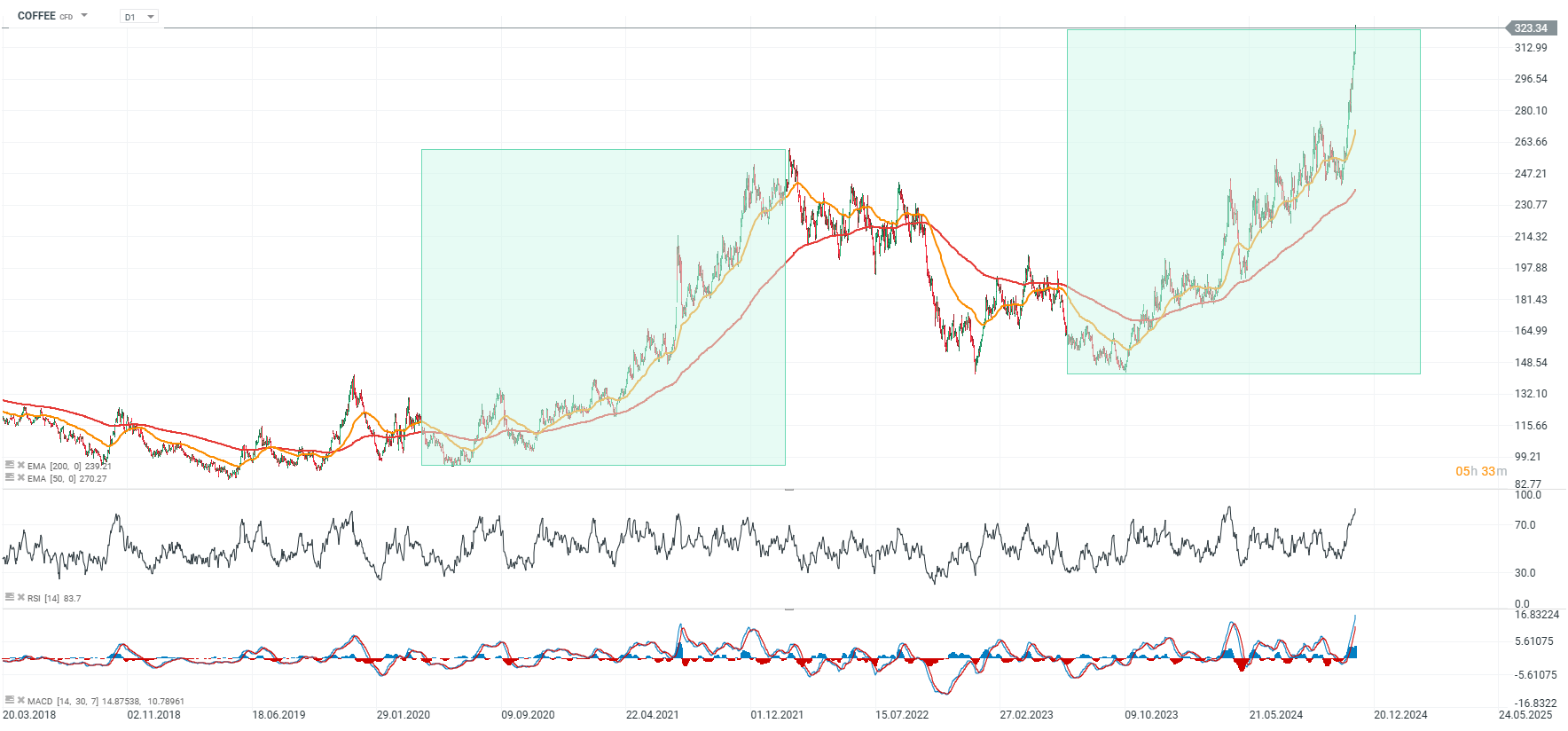Coffee futures on Arabica surges 4.6% to $323 amid spreading fears of a global supply shortage (dry and hot weather in Brazil) and the threat of tariffs on imports into the US. More than 70% price performance this year, driven prices to the highest level since 1977. Probably, Brazilian production of Arabica producer will fall next season, reducing global supplies that are already tight. Also, media reports suggest that US roasters are exacerbating the squeeze as they respond to Donald Trump’s promise to impose import tariffs on a range of goods since January 2025.
- Brazil, the largest exporter of premium arabica beans, is grappling with concerns over its upcoming 2025-26 crop due to weather volatility. Coffee growers are also holding back on sales after already moving significant volumes of the current harvest, leading to tight supplies until the next harvest in May. Vietnam, the leading robusta producer, has faced a double blow: dryness during critical growing periods and heavy rains during harvest, impacting production quality and quantity.
- Sellers and roasters have raised prices while reducing discounts to manage margins. Nestlé announced price increases and smaller package sizes as robusta prices soared almost 90% this year. Meanwhile, hedging costs and potential producer defaults are adding to the stress on market participants. Speculative bullish bets remain historically high, reflecting fund managers' confidence in continued price increases despite near-term volatility.
- The looming EU deforestation regulations and potential trade tariffs under a Trump administration are contributing to uncertainty, prompting front-loading of US-bound sales. Secondary producers like Colombia and Costa Rica are still recovering from adverse weather, further straining global supply.
COFEE (D1 interval)

Source: xStation5
Coffee CoT report highlights (the latest, 19 November 2024)
- Total open interest decreased on Coffee (ICE) by 5,819 contracts to 199,432 contracts The managed money long positions saw a net increase of 2,910 contracts, reflecting bullish sentiment among large speculators.
- Producer/merchant short positions remain dominant at 94,099 contracts (hedging against future price decreases), compared to only 34,985 long contracts, indicating they are predominantly hedging against potential price declines. It's substantial hedging activity by producers expecting downside risks.The decline of 4,052 short contracts suggests some producers are scaling back their hedges, possibly due to stabilizing concerns over supply.
- Managed Money (Speculative Traders) Long positions surged by mentioned 2,910 contracts, bringing their total to 64,891 contracts, signaling heightened speculative interest in higher prices. The relatively low short positions (3,308 contracts) indicate that most speculators remain bullish. The largest 4 traders control 22.5% of the short interest and 13.0% of the long interest, showing a concentration of risk among major players.
Overall, in the CoT report, we can see that Managed Money are much more bullish on coffee than direct market participants. Rising coffee prices are set to burden consumers with higher costs, while cafés and roasters face the challenge of balancing affordability with margin preservation.

Daily Summary - Powerful NFP report could delay Fed rate cuts

BREAKING: Massive increase in US oil reserves!

Market wrap: Oil gains amid US - Iran tensions 📈 European indices muted before US NFP report

📈 Gold jumps 1.5% ahead of NFP, hitting its highest level since Jan. 30


